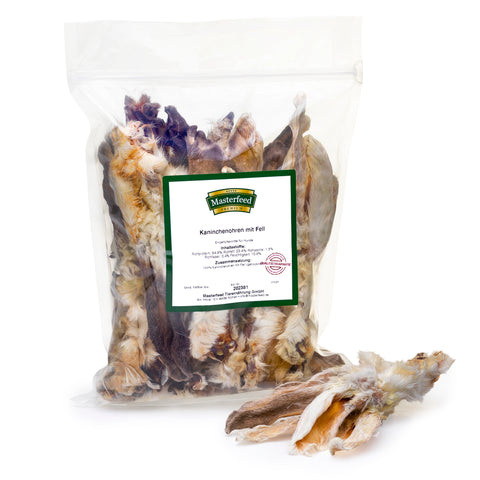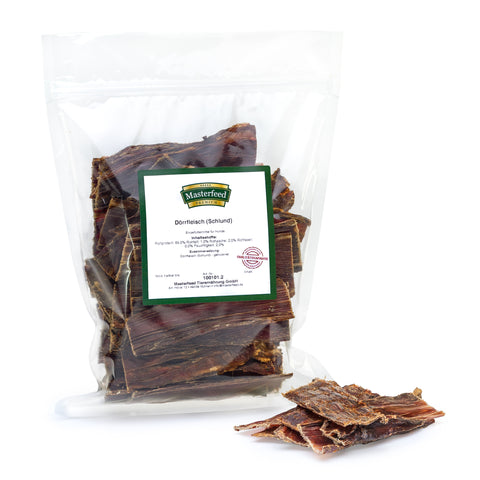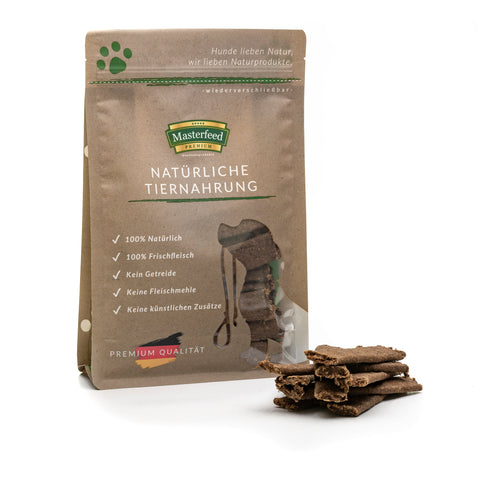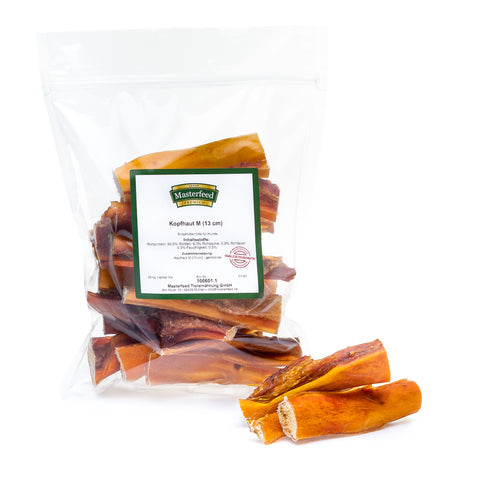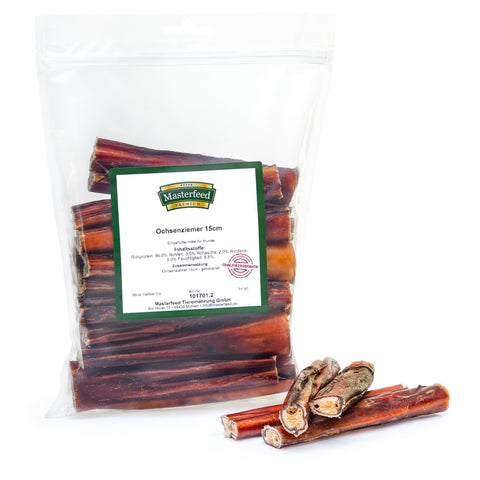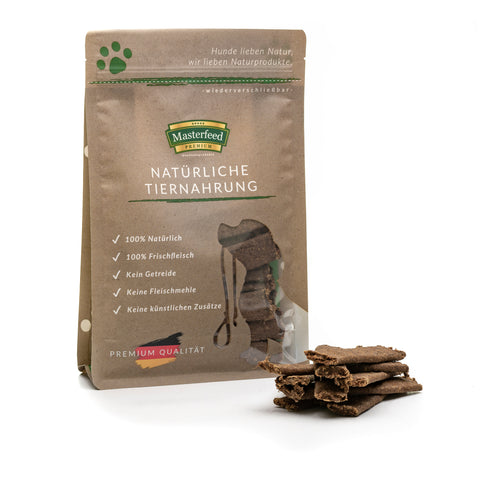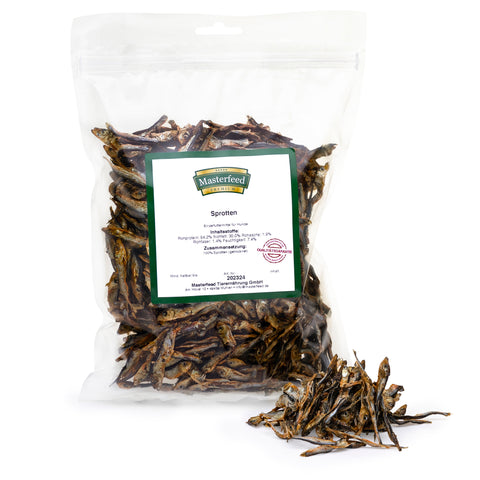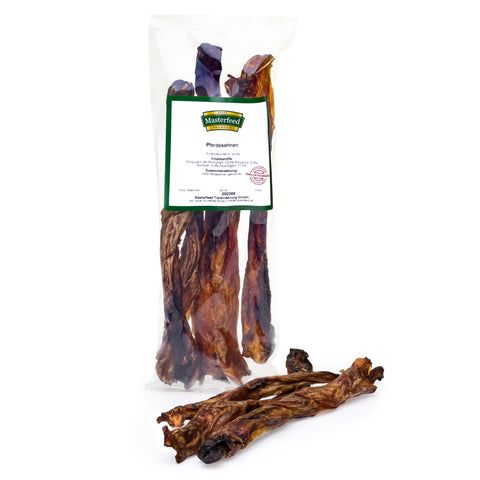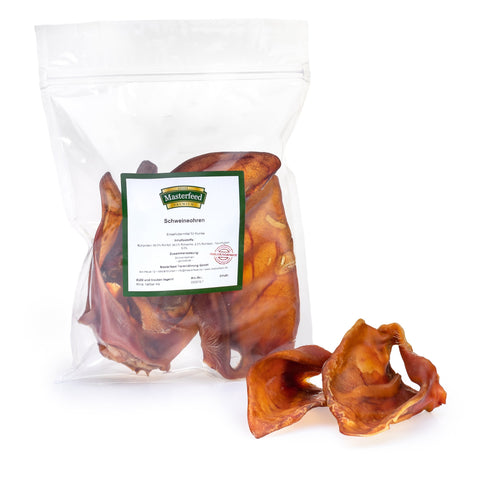Are fish treats healthy for dogs? Fish treats are rich in omega-3 fatty acids and protein, which are beneficial for your dog's health. In this article, you'll learn more about the benefits, suitable fish species, and how to choose the best fish treats for dogs.
The most important things at a glance
-
Fish treats offer numerous health benefits, including omega-3 fatty acids, high-quality protein, and hypoallergenic properties.
-
Different types of fish and preparation methods make it possible to take into account the individual needs and preferences of dogs.
-
Fish treats can be used effectively in training and help strengthen the bond between dog and owner.
Benefits of fish treats for dogs

Fish is a treasure trove of nutrients that are invaluable to your dog's health. Fish such as salmon, herring, and mackerel are particularly rich in omega-3 fatty acids, which have anti-inflammatory properties and support joint health. These fatty acids are also known to promote a shiny coat and strengthen the cardiovascular system.
In addition to valuable omega-3 fatty acids, fish also provides high-quality protein, which is especially beneficial for active or recovering dogs. These proteins are easily digestible and help maintain and strengthen muscle mass. Fish also contains essential vitamins such as vitamin D, which is important for bone health.
Another great advantage of fish treats is their hypoallergenic properties. Since they are less likely to trigger allergic reactions, they are especially suitable for sensitive dogs. Products with added omega-3 fatty acids are also popular, as they promote healthy skin and coat.
The health benefits are rounded out by immune system support and the promotion of skin and coat health. Regularly giving fish treats can therefore significantly improve your dog's overall well-being and help them lead a happier and healthier life.
Suitable fish species for treats

When it comes to choosing the right fish for dog treats, there are a variety of options. Salmon and mackerel are particularly popular because they are not only tasty but also rich in omega-3 fatty acids and other important nutrients. These fish are ideal for promoting your dog's health while providing them with a delicious reward.
Fish can be offered in various forms, including:
-
whole fish, which offer a natural chewing option and are particularly rich in nutrients
-
small pieces that are practical for training and as a small reward in between
-
Fish skin, which is a crunchy and healthy option and is especially good for your dog's dental health
It's important to choose the right type and shape of fish based on your dog's preferences and needs. This way, you can ensure your four-legged friend receives not only a tasty but also a healthy treat that perfectly complements their diet.
Fish treats for allergy-suffering dogs
For dogs suffering from food allergies, fish treats can be an excellent alternative to traditional snacks. Because fish is naturally hypoallergenic, these treats are less likely to trigger allergic reactions. This makes them a safe choice for dogs with sensitive stomachs or special dietary needs.
This could be the text in which the word “basic price” is integrated.
Organic salmon trimmings certified according to DE-ÖKO-006 are particularly suitable for sensitive dogs. These high-quality products are not only gentle on your dog's stomach but also offer all the benefits of fish treats. There are also special fish treats specifically developed for dogs with allergies to meet their specific needs.
Anus:
Particularly suitable for sensitive dogs are:
-
Organic salmon cuts certified according to DE-ÖKO-006
-
High-quality products that are gentle on your dog's stomach and offer all the benefits of fish treats
-
Special fish treats developed for dogs with allergies to meet their specific needs
It's important to know your dog's needs and choose the right treats. Older dogs or dogs with health issues may require more easily digestible options. By carefully selecting the right products, you can ensure your dog doesn't miss out on tasty rewards, even with special dietary needs.
Preparation methods of fish treats

Fish treats can be prepared in a variety of ways to meet your dog's different needs and preferences. One popular method is using raw fish, which is rich in nutrients, but must be frozen for 24 hours before feeding to kill parasites. Raw fish must be thoroughly inspected for hygiene to minimize health risks.
Another method of preparation is boiling the fish. Cooked fish retains its nutrients and is easier to digest, making it a safe choice for many dogs. Cooked fish should be prepared without harmful ingredients like onions to ensure safety for your dog.
Dried fish is a convenient snack option, especially for dogs with food intolerances. Dried fish should be given without preservatives or salt to protect your dog's health.
The size and texture of the fish treats can be adjusted to suit different breeds to make them easier for each dog to chew and swallow.
How often should dogs get fish treats?
Fish treats can be given daily as a reward, but it's important to adjust the total daily ration to ensure a balanced diet. They can also be fed several times a week as part of a meal, increasing variety in your dog's diet and promoting overall health.
It's crucial to control the amount of treats given and ensure they don't cause nutritional imbalances. Moderation is key to achieving the best health results for your dog.
Possible risks when feeding fish treats
While fish treats offer many benefits, there are also some risks that dog owners should be aware of. Bones from cooked fish are brittle and can be dangerous; they should be carefully removed before feeding. It's important to remove all bones from fish to avoid the risk of choking in dogs.
Another risk is the presence of parasites in raw freshwater fish, which is why it should be frozen before feeding to kill the parasites. To ensure all parasites and bacteria are killed, the fish should be thoroughly cooked.
Certain fish species, such as carp and anchovies, contain thiaminase, which breaks down vitamin B1, while cod and cod are thiaminase-free and safe for dogs. When feeding fish treats, it's crucial to choose the right fish species and ensure safe preparation.
Popular fish treat products on the market

There are a variety of fish treat products on the market that are offered as delicious snacks for dogs. Dried fish pieces and fish sticks are widely available and especially popular with dogs. Brands like Dr. Clauders and Terra Canis offer high-quality fish dog treats specifically formulated for dogs' needs.
When purchasing fish treats, it's important to pay attention to the ingredients and contents of the products to ensure they're healthy and safe for your dog. The product selection can be overwhelming, but by carefully examining the ingredients and quality, you can find the best treats for your dog that are both tasty and nutritious.
Using fish treats in training

Fish treats are not only healthy but also extremely effective in dog training. Small fish treats are ideal as a reward during training, as dogs readily accept them. The fish treats should be small to make them easy to use as a motivational reward.
Using fish treats during training increases dog motivation and improves training success. These treats can also strengthen the bond between dog and owner by serving as positive reinforcement.
Fish treats for different dog breeds
Fish treats are suitable for dogs of all sizes and breeds. Fish rolls, for example, are a versatile option that works for both small and large dogs. These treats can be customized to the size and texture to make them easier for every dog to chew and swallow.
Finely chopped fish treats can be used effectively as a motivator and reward in dog training. They are easy to handle and offer a healthy and tasty option for dogs of all breeds.
The adaptability and versatility of fish treats make them an ideal choice for all dog owners who want to reward their four-legged friends with healthy and tasty snacks.
Summary
In summary, fish treats are an excellent choice for your dog's diet and training. They offer numerous health benefits, are hypoallergenic, and are versatile.
By choosing the appropriate fish species and preparation methods, and keeping the risks in mind, you can ensure your dog receives the best possible reward. Try fish treats and watch your dog respond with joy and health!
Frequently Asked Questions
Are fish treats safe for all dogs?
Fish treats are generally safe for dogs as long as they are well prepared and boneless. Be sure to check the quality and preparation to ensure your dog's health.
Can fish treats cause allergies in dogs?
Fish treats are generally hypoallergenic and therefore less likely to trigger allergies in dogs, making them ideal for sensitive animals.
How often can I give my dog fish treats?
Fish treats can be given daily or several times a week as long as the total food amount is adjusted.


